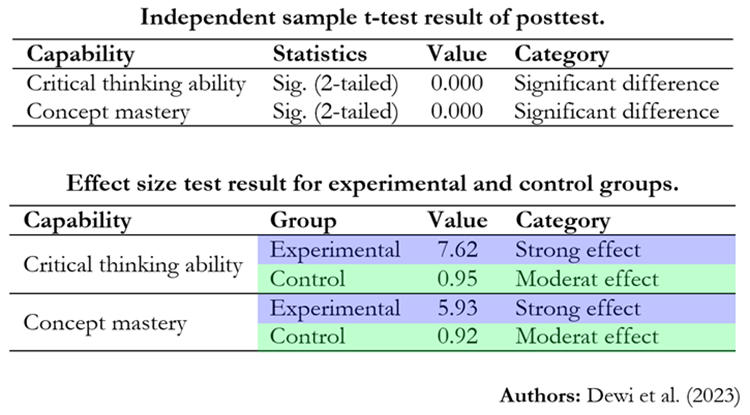
The Effect of Online Discovery-Inquiry Learning on Improving Critical Thinking Ability and Concept Mastery in Temperature and Heat Materials
Abstract
The research endeavors to investigate the impact of implementing discovery-inquiry learning concerning the topic of temperature and heat on the enhancement of students’ critical thinking abilities and concept mastery. The study adopted a quasi-experimental design, employing a pretest-posttest control group framework. A cluster random sampling technique was applied to select the research sample, which comprised 36 students from class XI MIPA 3 (control group) and class XI MIPA 4 (experimental group) at SMA Negeri Rambipuji. The assessment instruments employed were two essay-shaped tests, specifically designed for evaluating critical thinking ability and concept mastery. Data analysis involved the utilization of independent sample t-test and effect size test. The results revealed a statistically significant improvement in students’ critical thinking ability and concept mastery with a robust effect size, categorizing the impact of discovery-inquiry learning as substantial. Consequently, it can be inferred that discovery-inquiry learning is efficacious in augmenting students’ critical thinking abilities and concept mastery pertaining to the subject of temperature and heat.
Keywords
Full Text:
PDFReferences
Aji, R. H. S. (2020). Dampak COVID-19 pada pendidikan di indonesia: Sekolah, keterampilan, dan proses pembelajaran. Jurnal Sosial & Budaya Syar-i, 7(5), 395–402. https://doi.org/10.15408/sjsbs.v7i5.15314
Akınoğlu, O., & Tandoğan, R. Ö. (2007). The effects of problem-based active learning in science education on students’ academic achievement, attitude and concept learning. Eurasia journal of mathematics, science and technology education, 3(1), 71–81. https://doi.org/10.12973/ejmste/75375
Anggraini, A. D. (2017). Efektivitas pembelajaran blended learning berbasis community of inquiry (COI) terhadap hasil belajar kognitif dan persepsi mahasiswa pada matakuliah pemisahan kimia pokok bahasan kromatografi (Master thesis, Universitas Negeri Malang, Malang, Indonesia). Retrieved from https://repository.um.ac.id/60148/
Che, F. S. (2002). Teaching critical thinking skills in a Hong Kong secondary school. Asia Pacific Education Review, 3, 83–91. https://doi.org/10.1007/BF03024923
Creswell, J. W. (2012). Educational research: Planning, conducting, and evaluating quantitative and qualitative research (4th ed.). Upper Saddle River, NJ: Pearson Education Inc.
Duran, M., & Dökme, I. (2016). The effect of the inquiry-based learning approach on student's critical-thinking skills. Eurasia Journal of Mathematics Science and Technology Education, 12(12), 2887–2908. https://doi.org/10.12973/eurasia.2016.02311a
Facione, P. A. (2015). Critical thinking: What it is and why it counts. Hermosa Beach, CA: Insight Assessment.
Fatmawati, H., Mardiyana, M., & Triyanto, T. (2014). Analisis berpikir kritis siswa dalam pemecahan masalah matematika berdasarkan polya pada pokok bahasan persamaan kuadrat (penelitian pada siswa kelas X SMK Muhammadiyah 1 Sragen tahun pelajaran 2013/2014). Jurnal Pembelajaran Matematika, 2(9), 899–910.
Heong, Y. M., Othman, W. B., Yunos, J. B. M., Kiong, T. T., Hassan, R. B., & Mohamad, M. M. B. (2011). The level of marzano higher order thinking skills among technical education students. International Journal of Social Science and Humanity, 1(2), 121–125.
Holmes, N. G., Wieman, C. E., & Bonn, D. A. (2015). Teaching critical thinking. Psychological and Cognitive Sciences, 112(36), 11199–11204. https://doi.org/10.1073/pnas.1505329112
Huber, C. R., & Kuncel, N. R. (2016). Does college teach critical thinking? A meta-analysis. Review of Educational Research, 86(2), 431–468. https://doi.org/10.3102/0034654315605917
Huda, C., Aji, S., Hudha, M., Wartono, M., & Gamat, F. (2018). Inquiry/discovery-based instruction to improve critical thinking skills and mastery of physics concepts. In N. Mariana et al. (Eds.), Advances in social science, education and humanities research. Proceedings of the 1st International Conference on Education Innovation (ICEI 2017) (pp. 66–68). Red Hook, NY: Atlantis Press. https://doi.org/10.2991/icei-17.2018.18
Ichsan, I. Z., Rahmayanti, H., Purwanto, A., Sigit, D. V., Kurniawan, E., Dewi, A. K., ... & Marhento, G. (2020). Covid-19 dan e-learning: Perubahan strategi pembelajaran sains dan lingkungan di SMP. JINoP (Jurnal Inovasi Pembelajaran), 6(1), 50–61. https://doi.org/10.22219/jinop.v6i1.11791
Keleş, Ö., & Özsoy, S. (2009). Pre-service teachers’ attitudes toward use of Vee diagrams in general physics laboratory. International Electronic Journal of Elementary Education, 1(3), 124–140.
Kruatong, T., Sung-ong, S., Singh, P., & Jones, A. (2006). Thai high school students’ understanding of heat and thermodynamics. Kasetsart Journal of Social Sciences, 27(2), 321–330.
Lay, A. N., & Osman, K. (2018). Developing 21st century chemistry learning through designing digital games. Journal of Education In Science Environment And Health, 4(1), 81–92. https://doi.org/10.21891/jeseh.387499
Lee, A. Y. L. (2016). Media education in the School 2.0 era: Teaching media literacy through laptop computers and iPads. Global Media and China, 1(4), 435–449. https://doi.org/10.1177/2059436416667129
Lyu, D., & Wang, B. (2018). Effects of the application of computer network technology to guided discovery teaching on learning achievement and outcome. Eurasia Journal of Mathematics, Science and Technology Education, 14(7), 3269–3276. https://doi.org/10.29333/ejmste/91249
Puspitasari, Y. A., Lesmono, A. D., & Bachtiar, R. W. (2017). Pembelajaran inkuiri terbimbing terhadap peningkatan kemampuan berpikir kritis siswa SMA materi suhu dan kalor kelas XI. In A. D. Lesmono et al. (Eds.), Peran pendidikan, sains, dan teknologi untuk mengembangkan budaya ilmiah dan inovasi terbarukan dalam mendukung sustainable development goals (SDGs) 2030. Proceedings of the Seminar Nasional Pendidikan Fisika 2017 (pp. 340–344). Jember, Indonesia.
Rahmawati, Y., Mardiyana, M., & Subanti, S. (2014). Pengembangan perangkat pembelajaran berbasis penemuan terbimbing (guided discovery) dengan pendekatan somatic, auditory, visual, intellectual (SAVI) pada materi pokok peluang kelas IX SMP tahun pelajaran 2013/2014. Jurnal Pembelajaran Matematika, 2(4), 379–388.
Rusilowati, A. (2013). Pengembangan perangkat pembelajaran metode discovery learning untuk pemahaman sains pada anak TK B. Journal of Primary Education, 2(2), 71–76. https://doi.org/10.15294/jpe.v2i2.3064
Suryawan, I. P. A., Santyasa, I. W., & Sudarma, I. K. (2020). Pengaruh metode pembelajaran discovery-inquiry terhadap reduksi miskonsepsi dan prestasi belajar fisika. Jurnal Teknologi Pembelajaran Indonesia, 10(1), 25–34. https://doi.org/10.23887/jtpi.v10i1.3395
Thaiposri, P., & Wannapiroon, P. (2015). Enhancing students’ critical thinking skills through teaching and learning by inquiry-based learning activities using social network and cloud computing. Procedia-Social and Behavioral Sciences, 174, 2137–2144. https://doi.org/10.1016/j.sbspro.2015.02.013
Tiarina, Y. (2012). Pengajaran puisi dengan metode discovery-inquiry. Komposisi: Jurnal Pendidikan Bahasa, Sastra, dan Seni, 10(2), 127–132. https://doi.org/10.24036/komposisi.v10i2.61
Tompo, B., Ahmad, A., & Muris, M. (2016). The development of discovery-inquiry learning model to reduce the science misconceptions of junior high school students. International Journal of Environmental and Science Education, 11(12), 5676–5686.
Utami, R., Djudin, T., & Arsyid, S. B. (2014). Remediasi miskonsepsi pada fluida statis melalui model pembelajaran TGT berbantuan mind mapping di SMA. Jurnal Pendidikan dan Pembelajaran Khatulistiwa (JPPK), 3(12), 1–12. http://dx.doi.org/10.26418/jppk.v3i12.8181
Wartono, W., Batlolona, J. R., Sholikhan, S., & Huda, C. (2017a). Influence of discovery learning-based empirical-theoritical study assisted by animation Phet on the physics problem-solving in high school. In S. Irawanti et al. (Eds.), Advances in social science, education and humanities research. Proceedings of the International Conference on Learning Innovation (ICLI 2017) (pp. 47–51). Red Hook, NY: Atlantis Press. https://doi.org/10.2991/icli-17.2018.9
Wartono, W., Hudha, M. N., & Batlolona, J. R. (2017b). How are the physics critical thinking skills of the students taught by using inquiry-discovery through empirical and theorethical overview?. Eurasia Journal of Mathematics, Science and Technology Education, 14(2), 691–697. https://doi.org/10.12973/ejmste/80632
Wartono, W., Takaria, J., Batlolona, J. R., Grusche, S., Hudha, M. N., & Jayanti, Y. M. (2018). Inquiry-discovery empowering high order thinking skills and scientific literacy on substance pressure topic. Jurnal Ilmiah Pendidikan Fisika Al-Biruni, 7(2), 139–151. https://doi.org/10.24042/jipfalbiruni.v7i2.2629
Wenning, C. J. & Vieyra, R. E. (2020). Scientific inquiry in introductory physics. In C. J. Wenning & R. E. Vieyra, Teaching high school physics: The nature of physics teaching. Melville, NY: AIP Publishing LLC. https://doi.org/10.1063/9780735421967_005
Widura, H. S., Karyanto, P., & Ariyanto, J. (2015). Pengaruh model guided discovery learning terhadap kemampuan berpikir kritis siswa kelas X SMA Negeri 8 Surakarta tahun pelajaran 2014/2015. Bio-Pedagogi, 4(2), 25–30.
Yadaeni, A., Kusairi, S., & Parno, P. (2018). Penguasaan konsep dan keterampilan proses sains siswa kelas XII pada materi fluida statis. Jurnal Pendidikan: Teori, Penelitian, dan Pengembangan, 3(3), 357–364. http://dx.doi.org/10.17977/jptpp.v3i3.10657
Yeritia, S., Wahyudi, W., & Rahayu, S. (2017). Pengaruh model pembelajaran inkuiri terbimbing terhadap penguasaan konsep dan kemampuan berpikir kritis fisika peserta didik kelas X SMAN 1 Kuripan tahun ajaran 2017/2018. Jurnal Pendidikan Fisika Dan Teknologi, 3(2), 181–187. https://doi.org/10.29303/jpft.v3i2.398
Zewdie, Z. M. (2014). An investigation of students’ approaches to problem solving in physics courses. International Journal of Chemical and Natural Science, 2(1), 77–89.
Jurnal Pendidikan Sains Journal of Science, Mathematics, and Vocational Education Graduate School Of Universitas Negeri Malang JPS is licensed under Creative Commons Attribution-ShareAlike 4.0 International License |







